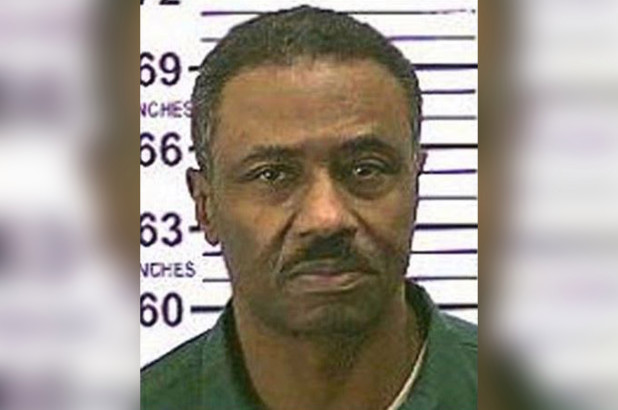





Herman Bell
The upcoming release of three-time cop killer Herman Bell has been put on hold for now, union officials announced Thursday.
The Patrolmen’s Benevolent Association filed a lawsuit on behalf of Diane Piagentini, whose husband, Joseph, was murdered by Bell and his cronies in 1971, challenging the parole board’s decision last month to grant release to the now-70-year-old.
The suit also sought a temporary restraining order — preventing Bell’s release pending the outcome of the suit — which was granted, according to the PBA.
“This Parole Board blew the call by making a decision to release this cold-blooded assassin without having considered all of the facts as the law requires,” PBA president Patrick Lynch said in a statement.
Bell and two buddies, all members of the Black Liberation Army, ambushed Piagentini, 28, and Waverly Jones, 33, after luring them to a Harlem housing project with a bogus 911 call.
The two cops were ambushed from behind. Jones, a father of three, died instantly; Bell used Piagentini’s own gun to finish him off — even as Piagentini begged for his life, pleading that his wife and two young daughters were waiting for him at home.
Bell also has a third cop’s blood on his hands. Months after the double assassination in Harlem, Bell was in San Francisco, where he killed Sgt. John Young during a BLA siege on a police station.
Bell and his co-defendant Anthony Bottom were convicted at trial of murdering Jones and Piagentini and both sentenced to 25 years to life behind bars — the maximum sentence allowed at that time. They became eligible for parole after serving 25 years.
In California, Bell copped a plea deal in 2009 that landed him just five years’ probation for Young’s death.
He maintained his innocence in Piagentini and Jones’ death up until 2012, when he finally admitted he wasn’t framed.
He’d already been denied parole seven times when the board voted 2-1 to release him — saying he was unlikely to reoffend.
“Said consideration has led the majority of this panel to concur that your release is not incompatible with the welfare of society and further believes you can live a law-abiding life,” the board wrote in its decision.
Boards before and after Bell’s admission of guilt rejected his bids for freedom, saying releasing him “would deprecate the severity of this crime.”
Piagentini’s lawsuit accuses the board of breaking the law by failing to consider records from Bell’s sentencing in 1975 during which he was unrepentant.
“Until we have justice, we will fight. We will fight authority, those who represent authority,” Bell said before he was sentenced.
At the time, prosecutors said he and Bottom were “beyond redemption and can never be rehabilitated.”
The judge in the case also noted that the two killers “had no aversion to inflicting capital punishment upon others in a fashion which was random and arbitrary.”
“What they [Piagentini and Jones] faced was the instantaneous snuffing out of their lives, coldly, impersonally and savagely,” the judge said at the time. “Acts which were then followed by a celebration that the enemy, unaware, had been slain. That is what we are dealing with here.”
The suit also claims the board ignored the fact that for years Bell failed to accept responsibility for the cops’ murders — and only admitted to them after appearing before the board four times.
Last month, the PBA demanded a rescission hearing, saying parole officials also never took into account the feelings of Jones’ brother, Manny, who only learned of Bell’s impending release through the media.
The union blasted Bell’s sudden admission of guilt as “tailored to fit the board’s rehabilitation guidelines.”
Police officials and politicians have railed against Bell’s release, saying it would minimize the lives of the police officers tasked with upholding the law.
But Bell’s attorney, Robert Boyle, insisted he was a changed man. Bell earned his master’s degree and has counseled “hundreds of inmates” while behind bars, he said.
“People change. People evolve. That’s the whole point,” said Boyle. “The seriousness of the offense — and it was an extremely serious offense — will never change. But people do change.”
“Do you make an assessment as to whether that change is genuine? Of course you do — and that’s what the parole board did,” he added.
Boyle said Bell has a low risk of recidivism because of his age. The lawyer defended the parole board, saying it did consider the sentencing minutes as well as other key factors in granting Bell’s release.
He called Piagentini’s lawsuit “frivolous.”
“They acted in full compliance of the law,” Boyle said about the board.
A hearing in Piagentini’s lawsuit has been set for April 13 in Albany Supreme Court.
“Herman Bell denied his crime for four decades. Now, to meet parole requirements, he has admitted his role in the sadistic murder of my husband Joe,” Piagentini said in a statement. “He should suffer the torment of knowing that he will spend the rest of his natural life in prison for that crime, just as our family has forever been denied the blessing s of having Joe with us. That is a punishment that he has earned and he deserves.”
Under present law, Bell would’ve faced a mandatory sentence of life without the possibility of parole.
Bottom comes up for parole again in June.